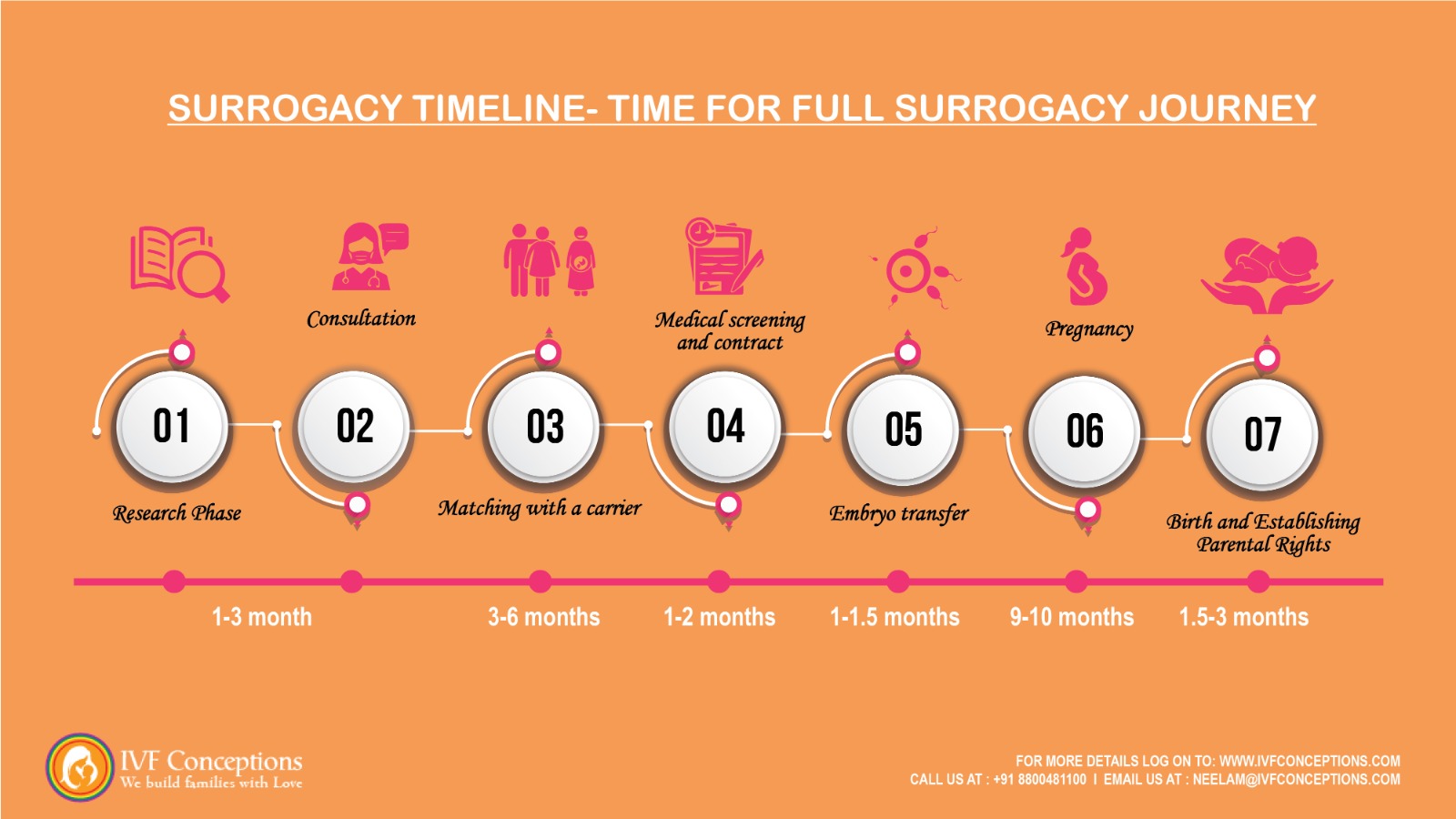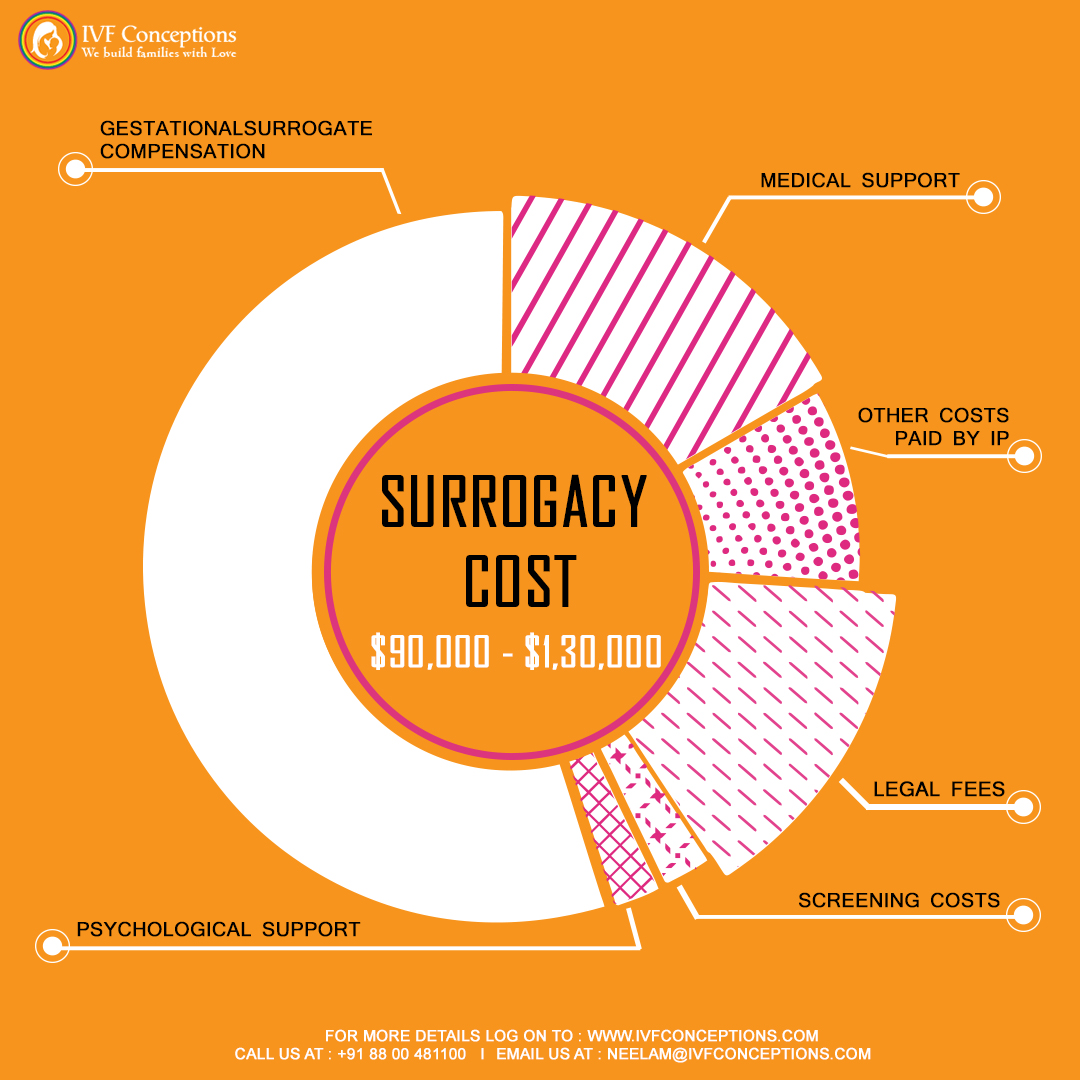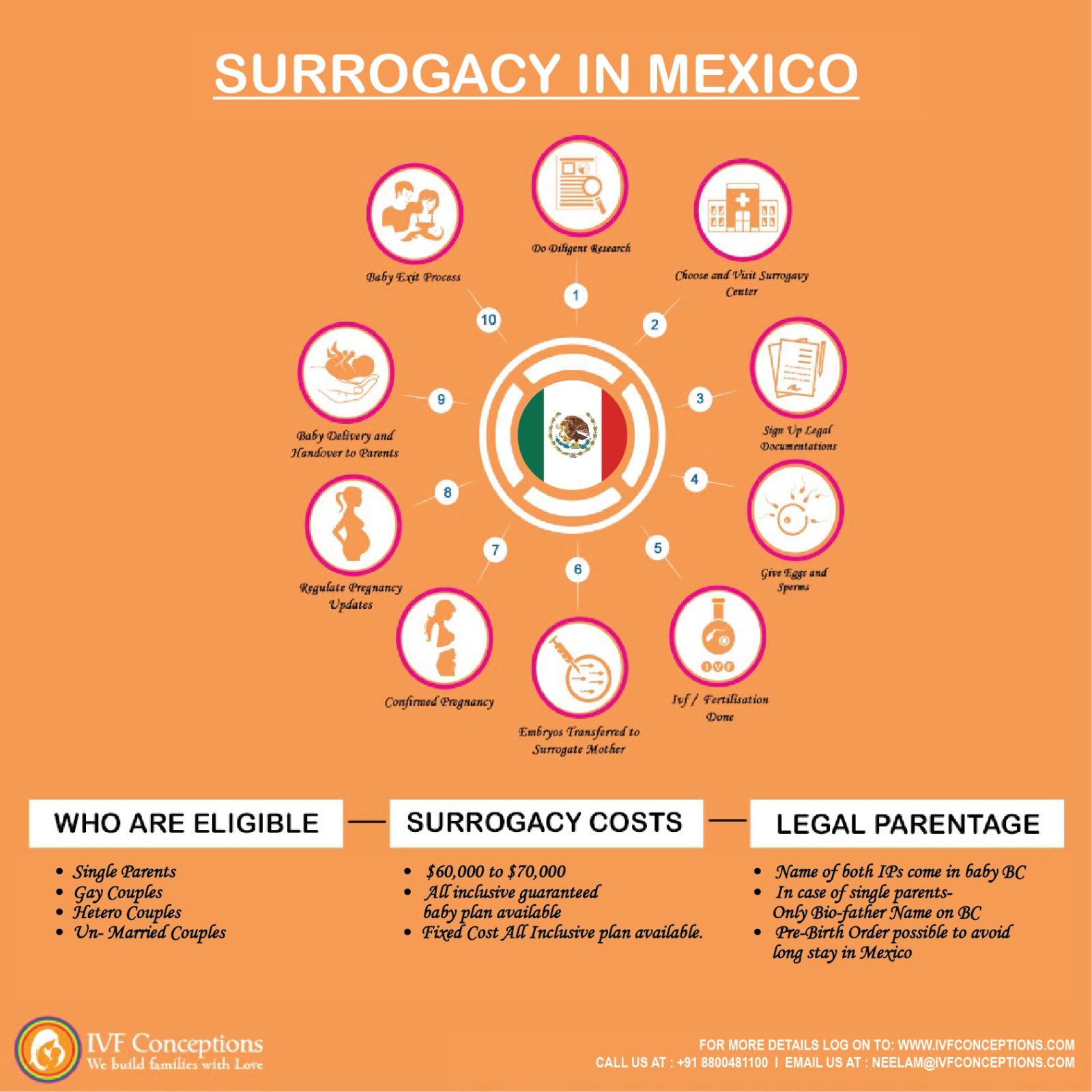How to Have a Baby Through Surrogacy: A Complete Guide
Have you ever thought about surrogacy as a way to become a parent? It’s a growing option for those facing infertility. This guide will cover everything from the types of surrogacy to legal and financial aspects.
Gestational Surrogacy is becoming more common, offering hope to many. Success rates are high, especially at reputable clinics. This guide will help you start your journey to becoming a parent.
- Book an online appointment: Get a free online consultation.
- Call\W:+91-8800481100 Email:neelam@ivfconceptions.com
Key Takeaways
- Surrogacy is a popular option for couples struggling with infertility, with success rates varying by method.
- The journey through surrogacy encompasses medical, legal, and emotional steps, necessitating thorough research and preparation.
- Finding the right surrogate is crucial, with costs ranging from $20,000 to $30,000 for agencies to facilitate the process.
- Gestational surrogacy involves creating an embryo using the intended parents’ or donor’s sperm and egg, ensuring no DNA link to the surrogate.
- Compensation for surrogates can range significantly, reflecting the vital and life-changing role they play in family creation.
- Consistent communication and personalized services offered by surrogacy agencies are key to a successful surrogacy journey.
- Navigating the legal aspects of surrogacy is essential for protecting the rights and obligations of all parties involved.
Additional Resources to Read:
Understanding Surrogate Age Requirements
Cheapest Countries for Gay Surrogacy
Understanding Surrogacy: An Overview
Surrogacy is a way for people to become parents. It’s becoming more popular, so it’s important to understand it well. Knowing about the different types of surrogacy can help those thinking about it.
Definition of Surrogacy and what is meaning of surrogacy
Surrogacy means a woman carries a baby for someone else, called the intended parents. They have legal agreements to make sure everyone knows their rights.
People choose surrogacy for many reasons, like overcoming infertility or helping same-sex couples.

Differentiating Between Traditional and Gestational Surrogacy
There are two main types of surrogacy: traditional and gestational. Traditional surrogacy means the surrogate’s eggs are used.
Gestational surrogacy uses an embryo from IVF, so the surrogate isn’t genetically related to the baby. More babies are born through gestational surrogacy in the U.S. each year.
The Rise in Popularity of Surrogacy
Surrogacy is getting more popular, thanks to new reproductive technologies and more acceptance of different family types. It’s especially appealing to those facing infertility, same-sex couples, or single parents.
With the right support and legal advice, more people are choosing surrogacy to become parents. However, the cost of gestational surrogacy can be high, so it’s something to think about carefully.
How to Have a Baby Through Surrogacy: The Process Explained
The surrogacy process has many steps and key players. Each step is important for a successful journey. Here’s a detailed look at the surrogacy process and the roles of key participants.
The surrogacy process takes 18 months to 24 months depending upon the individual circumstances
Outlines the surrogacy process timeline for intended parents:
| Stage | Description of Stage | Duration |
| Research Phase | Explore family building options and decide on surrogacy. | Personal timeframe |
| Consultation and Application | Choose a surrogacy agency, sign agreement, and start embryo creation (if needed). | 1-3 Months |
| Matching | Agency finds and presents potential gestational carriers. Meet and decide on a match. | 3-6 Months |
| Medical Screening and Contracts | Carrier undergoes medical and psychological screening. Sign surrogacy contract. | 1-2 Months |
| Embryo Transfer | Prepare for embryo transfer. Success may take multiple attempts. | 1-1.5 Months |
| Pregnancy | Gestational carrier’s pregnancy, approximately 40 weeks. | 9-10 Months |
| Birth and Postpartum | Baby’s birth, establish parental rights, and postpartum period. | 1.5-3 Months |
Please keep in mind that the durations mentioned in the table are approximate and can vary depending on individual circumstances and other factors. Always consult with a reputable surrogacy agency or professional to get personalized guidance throughout the surrogacy journey.

Step-by-Step Breakdown of the Surrogacy Journey
- Initial Consultation: Intended parents talk to a surrogacy agency. They learn about the process and options.
- Surrogate Selection: Agencies screen potential surrogates. They look at age, health, and pregnancy history. Pinnacle Surrogacy provides detailed profiles on surrogates.
- Legal Framework: Legal contracts protect everyone involved. Each side needs their own lawyer, especially in strict states like New York.
- IVF Process: The IVF process starts with a chosen surrogate. Parents might use their own eggs and sperm or choose from banks. The surrogate doesn’t use her own eggs.
- Embryo Transfer: After embryos are made, one is put into the surrogate’s uterus. This is a key step.
- Prenatal Care: The surrogate gets full prenatal care. This ensures the health of the surrogate and the baby.
- Birth and Postpartum: After the baby is born, the intended parents welcome it. Legal documents are finalized, confirming their custody.
Key Participants in the Surrogacy Process
Many important people are involved in the surrogacy journey:
- Intended Parents: These are people or couples wanting a child. They rely on a surrogate to carry the pregnancy.
- Surrogate: A gestational carrier who carries the pregnancy for the intended parents. Pinnacle Surrogacy screens surrogates for health and readiness.
- Fertility Specialists: Medical experts help with IVF. They ensure embryo quality and successful implantation.
- Legal Counsel: Lawyers specialize in surrogacy law. They draft contracts and follow state regulations.
- Surrogacy Agency: Agencies like Pinnacle Surrogacy match surrogates and intended parents. They support the process from start to finish.
| Key Participant | Role |
| Intended Parents | Seek to have a baby through surrogacy. |
| Surrogate | Carries the baby during pregnancy, providing support and health management. |
| Fertility Specialists | Handle the medical procedures associated with IVF and embryo transfer. |
| Legal Counsel | Ensure the legal protection of all parties involved and the integrity of the process. |
| Surrogacy Agency | Coordinates the relationships between surrogates and intended parents, providing oversight. |
understanding the surrogacy journey and the roles of key participants helps intended parents make informed decisions. This reflects their desires and needs. Over 1000 babies are born via surrogates in the U.S. each year. This shows the importance of knowing these key elements.
Why Choose Surrogacy?
Surrogacy is a special way for many to start their family journey. It’s especially helpful for those facing health issues, same-sex couples, and single parents. It’s a great alternative to adoption, offering a unique path to building a family.
-
Health Implications and Infertility Issues
Infertility can be a big challenge for many. It might come from health problems or failed IVF or IUI tries. Surrogacy lets people with infertility dreams come true by using a gestational surrogate.
Surrogates go through a detailed screening to ensure a healthy pregnancy. This increases the chances of success more than traditional treatments.

-
For Same-Sex Couples and Single Individuals
Surrogacy is a chance for same-sex couples to have a biological child. It lets them be part of the pregnancy journey. Single individuals also see it as a way to become parents, being involved in the pregnancy and beyond.
-
Alternatives to Adoption
Adoption is a great way to become a parent, but it’s not for everyone. Surrogacy offers control over the pregnancy and a deeper emotional bond with the surrogate. Intended parents are there for all the important moments, from embryo transfer to birth.
This connection is sometimes missing in adoption. Legal agreements and contracts make surrogacy a secure choice, reducing the uncertainty found in adoption.
Finding the Right Surrogate
Choosing the right surrogate is a key step in your journey. Many factors are important when picking a surrogate. Knowing what to look for can help find the best person for this role.
Criteria for Selecting a Surrogate Mother
When picking a surrogate, several things matter. Key factors include:
- Age: Candidates should be between 21 and 45 years old for a healthy pregnancy.
- Healthcare History: A full medical history is crucial to check for pregnancy risks.
- Previous Pregnancy Experience: Past pregnancies often mean a higher success rate.
- Willingness to Carry Multiples: Talk about if the surrogate is okay with carrying more than one child.
- Legal Understanding: The surrogate needs to know the legal side of her role.
- Personality and Lifestyle: Being compatible can make the relationship better.
Using Surrogacy Agencies vs. Independent Surrogacy
There are two main ways to find a surrogate: through agencies or independent surrogacy. Each has its own benefits and challenges:
| Aspect | Surrogacy Agencies | Independent Surrogacy |
| Screening Process | Agencies do a thorough check of surrogates | Less formal, needs personal checking |
| Support Services | Provides legal help and counseling | Depends on personal resources |
| Cost | Usually more expensive, includes agency fees | Can be cheaper, but varies |
| Matching Process | Helped by professionals | Based on personal connections |
Choosing between agencies and independent surrogacy is important. Knowing what to look for and the support available makes a big difference. Building trust and clear communication with your surrogate is key for a good experience.
Legal Considerations in Surrogacy
It’s important for intended parents to understand the legal side of surrogacy. Each state has its own surrogacy laws, which can greatly affect your journey. Getting legal advice is key to handling these complexities well.

Understanding State Laws and Regulations
Surrogacy laws vary across the U.S. Some places, like California and Colorado, support surrogacy fully. They allow for parentage orders before or after birth. But, other states, such as Arizona, have stricter rules that might limit what you can do. Knowing these differences is crucial to protect your rights and make the process smoother.
The Importance of Surrogacy Contracts
A good surrogacy contract outlines what everyone expects. It covers things like payment, health care for the surrogate, and what happens if there are problems. This contract is your legal shield, making sure everyone sticks to the agreement. Without a solid contract, you could face trouble later on.
Parental Rights and Legal Custody
Getting parental rights in surrogacy is a big deal. Each state has its own rules about when and how these rights are recognized. For example, some states let you get orders before the baby is born, while others require you to wait.
Talking to a lawyer can help you understand these rules and protect your rights as a parent.
| State | Surrogacy Type | Pre-Birth Order | Legal Custody Notes |
| California | Permitted | Available | No restrictions on marital status |
| Arizona | Prohibited | Granted if genetically related | Post-birth orders advised |
| Alabama | Permitted | Generally issued | No second-parent adoptions allowed |
| Colorado | Permitted | Issued regardless of relation | Adoptions may not be necessary |
| Connecticut | Permitted | Granted to all Intended Parents | Second-parent adoptions allowed |
How much does surrogacy cost?
Understanding the costs of surrogacy is key for those planning to become parents. The average surrogacy price in the USA is between $125,000 and $175,000. However, costs can vary a lot. This section will help you understand the costs and plan your budget.

Average cost of surrogacy in the USA
In the United States, surrogacy can be expensive. Costs include agency fees, surrogate fees, legal fees, medical procedures, and more. Here’s what you might expect:
| Expense Category | Estimated Cost |
| Agency Fees | $15,000 – $30,000 |
| Surrogate Fees | $30,000 – $60,000 |
| Legal Fees | $5,000 – $15,000 |
| Embryo Creation | $20,000 – $30,000 |
| Egg Donation | $20,000 – $30,000 |
| In Vitro Fertilization (IVF) | $10,000 – $15,000 |
| Insurance Costs | $10,000 – $30,000 |
| IVF Medications | $3,000 – $5,000 |
Breakdown of surrogacy
The surrogacy cost breakdown includes both fixed and variable costs. While agencies charge a fixed fee, other costs can change. Extra expenses like maternity clothes and travel can add up. These all affect your budget.
Tips to reduce high surrogacy cost
Managing surrogacy costs can be tough. Here are some tips for surrogacy savings to help:
- Research multiple agencies to find the best rate for services.
- Explore financing options or payment plans to spread out costs.
- Negotiate fees when possible, especially with surrogates.
- Look for package deals offered by fertility clinics that might reduce individual service costs.
- Consult with financial advisors who specialize in fertility planning to optimize budgeting.
International surrogacy Countries for affordable surrogacy journey
International surrogacy is becoming more affordable and has different legal rules. Many people look for countries where surrogacy is safe and legal. This section talks about some affordable places for surrogacy around the world.
Cheapest countries for surrogacy:
| Country | Regulation & Organization | Who are allowed to participate | Surrogacy Cost | Legal Assurance |
| Colombia | Altruistic | Singles, gay couples, hetero couples | Affordable
$70,000 |
Reliable |
| Mexico | Altruistic | Singles, gay couples, hetero couples | Affordable
$70,000 to $80,000 |
Reliable |
| USA | Commercial | Singles, gay couples, hetero couples | Costly
$150,000+ |
Strong |
| Ukraine | Commercial | Hetero couples | Affordable
$60,000 |
Strong |
| Georgia | Commercial | Hetero couples | Affordable
$60,000 |
Strong |
| Greece | Altruistic | Hetero couples and single women | Affordable
$80,000 |
Strong |
Legal Countries for Surrogacy
Ukraine, Georgia, Mexico, Colombia, and India are good choices for surrogacy. These countries have laws that protect everyone involved. This makes them great places for building a family through surrogacy.
Best Countries for Surrogacy
When looking at international surrogacy, people often pick places based on cost and laws. Here are some countries known for their good surrogacy laws and low costs:
- Ukraine
- Georgia
- Mexico
- Colombia
- India
Surrogacy in Mexico
Mexico is popular for surrogacy because it allows commercial agreements. Costs are between $35,000 to $60,000, depending on the situation. This makes Mexico a good choice for those looking at international surrogacy.

Surrogacy in Argentina
Argentina is starting to offer surrogacy options. It has laws that support gestational surrogacy. Costs and rules are changing, making it a good choice for some.
Surrogacy in Colombia
Colombia is a low-cost option with strong laws for same-sex couples. It’s welcoming and affordable for international parents.
Surrogacy in Georgia
Georgia has both commercial and altruistic surrogacy options. Costs are $30,000 to $60,000. It’s a popular choice for many families.
Surrogacy in Ukraine
Ukraine is a top choice for affordable surrogacy. Costs are $40,000 to $65,000. This includes medical and legal fees, making Ukraine a key place for surrogacy.

Surrogacy in India
India’s surrogacy is only for its citizens. Laws are still being made, making it uncertain for others.
Surrogacy in Armenia
Armenia is becoming a good option for surrogacy. Its laws support surrogate agreements, making it a growing choice.
Surrogacy in Albania
Albania is getting known for its surrogacy laws. As laws improve, it could become a good choice for families.
Surrogacy in Kazakhstan
Kazakhstan has a clear approach to surrogacy. It supports both parents and surrogates, making it a good choice.
Pros and Cons of surrogacy
Surrogacy is a special way for people to become parents, especially for those with infertility or same-sex couples. The advantages of surrogacy show why many choose it. But, knowing the disadvantages of surrogacy helps prepare intended parents for what’s ahead.
- Advantages:
- Surrogacy lets people and couples with infertility have a family, even after trying other ways.
- Gestational surrogacy keeps a biological link, which many want.
- It creates strong bonds between intended parents and surrogates, lasting a lifetime.
- Parents can be part of the pregnancy, seeing milestones and appointments with the surrogate.
- Surrogates often have a high success rate, better than some fertility treatments.
- Financial help from parents means surrogates don’t worry about medical costs, focusing on a healthy pregnancy.
- Disadvantages:
- Surrogacy has complex medical and legal steps, needing expert help.
- The costs can be high, a big challenge for some parents.
- Letting go of control can be hard, trusting the surrogate with the pregnancy.
- Surrogates face big physical demands, needing more medical checks and visits.
- Emotional challenges can happen, especially for surrogates carrying another family’s baby, needing support.
- The whole process takes a lot of time, often over a year.
| Pros | Cons |
| Allows for genetic connections through gestational surrogacy. | Involves significant emotional challenges for surrogates. |
| Strengthens relationships between intended parents and surrogates. | Can be financially burdensome due to high costs. |
| Intended parents can be active participants during the pregnancy. | Complex legal considerations must be addressed. |
| Higher potential success rates compared to other fertility treatments. | Physical demands on surrogates are substantial. |
Thinking about the pros and cons of parenting through surrogacy is key. It helps match personal goals with the realities of surrogacy. This balance is crucial for making an informed choice, aligning hopes with what’s possible.
Surrogacy Vs Adoption

Choosing between surrogacy and adoption means looking at many factors. These factors help you decide what’s best for your family. Both options have their own benefits and challenges.
The differences between surrogacy and adoption are big, especially about biological ties. In gestational surrogacy, parents can be biologically connected to their child. This is because they use their eggs and/or sperm. Adoption, however, doesn’t offer this biological link.
Money is another big factor. Surrogacy can cost a lot more than adoption. Intended parents pay for the surrogate’s compensation and other costs. Adoption, while it might have some expenses, usually doesn’t involve direct payments to birth mothers.
The legal side is also different. Surrogacy has a legal contract before pregnancy. This contract outlines everyone’s roles and duties. Adoption, however, can be less predictable because birth parents can change their minds.
Time is another consideration. Waiting for a surrogate can be shorter than the adoption process. Surrogacy also gives more control over the process. Many parts of it are planned and legally set, which can reduce surprises.
Adoption might appeal to those who want to help a child in need. Surrogacy might be for those who want to be more involved in the pregnancy and parenting.
Understanding the surrogacy vs adoption debate helps you choose what’s best for you. This careful thought helps you make a good decision as you start your family journey.
Additional Resources to Read:
Is Surrogacy Legal in Mexico? Know the Facts
IVF vs IUI: Comparing Fertility Treatment Options
Conclusion
Reflecting on the journey of parenthood through surrogacy is key. This guide has covered many important topics. From the differences between traditional and gestational surrogacy to legal, emotional, and financial aspects, the path is complex.
The surrogacy summary highlights both the challenges and joys. It shows that this journey is unique and special.
Every year, around 1,500 to 2,000 surrogate babies are born in the United States. This shows that surrogacy is becoming more common for those wanting to start a family. These thoughts on surrogacy are for those seeking a deeper connection and fulfillment through parenthood.
Remember, making informed decisions is vital. You need to know a lot and have support as you start this journey.
Surrogacy is a remarkable way to become a parent, especially for those facing medical or personal challenges. Think about why you want to take this path. Consider how your choices will shape your family’s future.
Approaching this journey with clarity and confidence can turn challenges into a rewarding family experience.
If you’d like to learn more about IVF, Egg Donation, or surrogacy services globally, check out the rest of our website at Georgia Surrogacy Agency. We offer legally secure and affordable surrogacy consulting services for FREE.
Get in touch for FREE SURROGACY CONSULTING:
Mobile: +91-8800481100 ( WhatsApp, Line, Viber)
Email: neelam@ivfconceptions.com

FAQ- How to Have a Baby Through Surrogacy
What is surrogacy?
Surrogacy is when a woman carries and gives birth to a child for someone else. This can be traditional or gestational. In traditional, the surrogate is related to the child. In gestational, she is not.
How does the surrogacy process work?
The process starts with finding a surrogate. Then, there’s in-vitro fertilization (IVF) and embryo transfer. The surrogate gets prenatal care. Many people help, like the intended parents and fertility experts.
What are the main reasons individuals choose surrogacy?
People choose surrogacy for health reasons, infertility, or to have biological kids. It’s especially common for same-sex couples or single parents. It’s a way to have a child without adopting.
How do I find the right surrogate?
Look for a surrogate based on her age, experience, and mental health. You can use agencies or go it alone. Make sure to check her background and get legal and emotional support.
What legal considerations should I be aware of in surrogacy?
Surrogacy laws vary by state. You need a clear contract to set expectations. After birth, you’ll face issues of parental rights. Always talk to a lawyer.
How much does surrogacy cost?
Surrogacy costs between $80,000 to $130,000 in the USA. This includes medical, legal, and surrogate fees. Plan your budget and look for ways to save.
What options are available for international surrogacy?
International surrogacy can be cheaper. Countries like Mexico and Ukraine allow it. Each place has its own rules, costs, and support. Research well before choosing.
What are the advantages and disadvantages of surrogacy?
Surrogacy lets you have a biological child and can be customized. But, it can be emotionally stressful and expensive. Think carefully before deciding.
How does surrogacy compare to adoption?
Surrogacy and adoption are different ways to become parents. Surrogacy offers a biological link, while adoption does not. Costs, legal processes, and timeframes differ. Choose what fits your family goals.
Source Links
- https://www.americansurrogacy.com/surrogacy/how-to-become-a-surrogate – Become a Surrogate [Complete Guide]
- https://www.webmd.com/infertility-and-reproduction/using-surrogate-mother – What Is Surrogacy and How Does It Work?
- https://my.clevelandclinic.org/health/articles/23186-gestational-surrogacy – Gestational Surrogacy: What Is It, Process, Risks & Benefits
- https://www.pinnaclesurrogacy.com/what-is-surrogacy – What Is Surrogacy? How Do Surrogates Get Pregnant?

Highly esteemed, authoritative, and trusted professional with a 14-year of experience in international surrogacy. Advocate for Secure, Legal, and Affordable International Surrogacy.
Neelam Chhagani, MA (Counselling Psychology) and Holistic Infertility and Third-Party Reproduction Consultant.
Member of European Fertility Society, Best Surrogacy Blogger of 2020, with 300 dedicated blogs, and top contributor on Quora for Surrogacy.


Add Your Comment